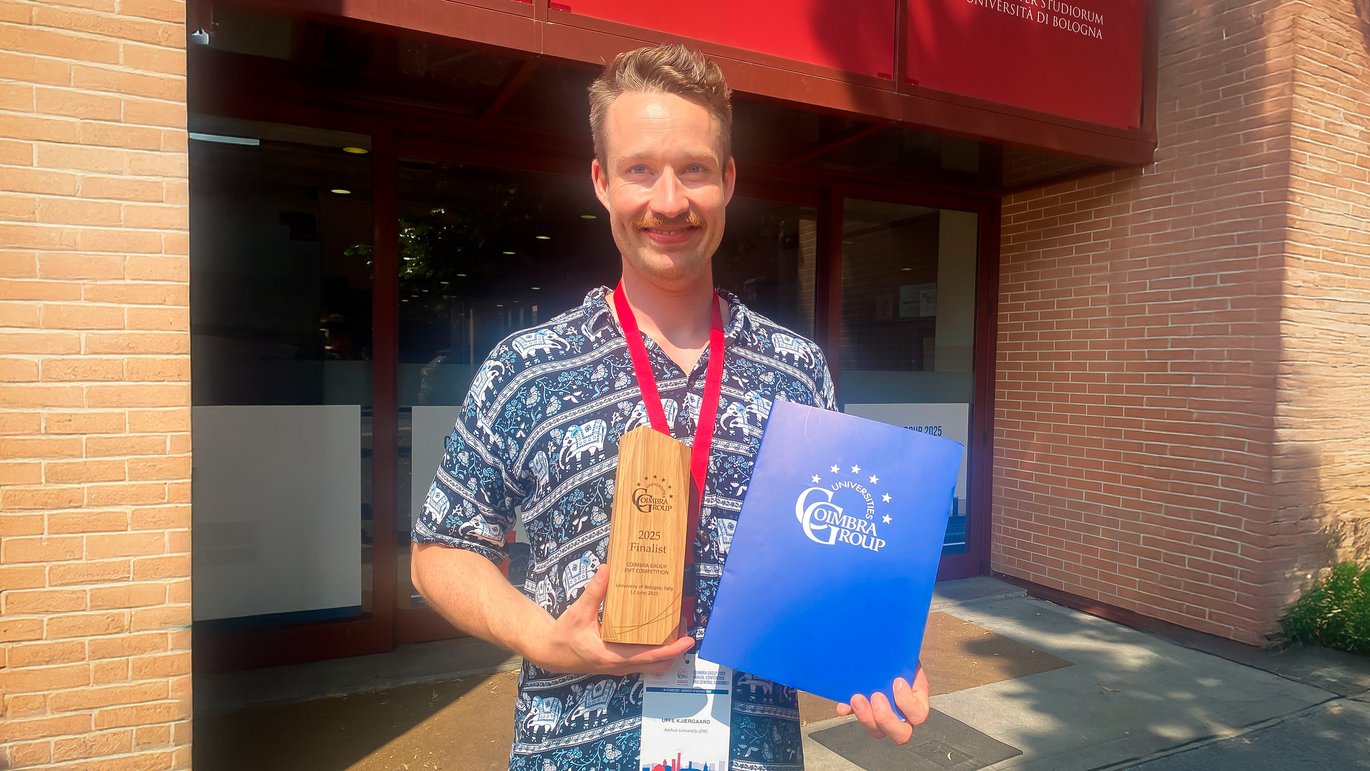Uffe Kjærgaard impressed in Bologna: “I just wanted to enjoy the experience”
PhD student Uffe Kjærgaard represented Aarhus University and Denmark in the international 3MT final in Bologna after winning on home turf. As one of three finalists, he recently took the stage at the prestigious 3MT competition in Bologna, Italy.

About 3MT
The Three Minute Thesis (3MT) is an international competition where PhD students must communicate their research in just three minutes, using only one slide, to a non-specialist audience.
The competition was founded at the University of Queensland in 2008 and is now held at many universities all over the world.
At Aarhus University's 3MT competition in March 2025, 17 candidates competed in Stakladen, and Uffe Kjærgaard from the Department of Clinical Medicine emerged victorious. He was subsequently selected as one of three finalists for the international 3MT final in Bologna.
When Uffe Kjærgaard was announced as the winner of the Three Minute Thesis (3MT) competition in Stakladen, Aarhus several months ago, he actually thought the journey had come to an end.
“There are 28 universities involved in the competition, and only three make it to the final. I honestly didn’t think I’d advanced, because it took a long time to hear anything after the final in Stakladen. I had almost put it out of my mind, but then one day the message came – and it was straight back to preparing,” he says.
Uffe Kjærgaard is a PhD student at the Department of Clinical Medicine, where he researches liver metabolism – focusing particularly on how metabolic processes change in disease. In his presentation, he spoke about using an advanced MRI technology called hyperpolarization, which may pave the way for earlier diagnosis of liver cancer.
The final in Bologna was the culmination of months of work distilling complex research into a three-minute presentation for a non-specialist audience – with only a single slide as support.
A very different stage than stakladen
Even though the rules were the same, the setting in Bologna was completely different from the competition in Aarhus.
“In Aarhus, we had the chance to stand on the stage in Stakladen a couple of weeks before the final and get a feel for the room. In Bologna, I didn’t see the stage until the day of the final, and that’s also when we were told that our slide wouldn’t be shown on the livestream, which people from all over the world could watch,” says Uffe Kjærgaard.
The physical layout of the stage also played a role.
“There was much less space than in Aarhus, and I usually move around quite a bit when I present – it helps me keep the audience’s attention. So that was a bit of a challenge, but luckily I managed to rehearse a few times before the final,” he explains.
An incredible experience – and second place in the competition
Despite limited preparation time and new conditions, Uffe delivered a presentation that earned him second place and a €1,500 prize.
“My main focus was actually just to enjoy it,” he says. “I was really happy to have made it to the final, and I think it was a really great experience. The audience in Bologna was amazing, so it was something very special to stand there and feel their engagement.”
Receiving recognition for his communication efforts means a lot to Uffe Kjærgaard.
“As a researcher, it can be challenging to present your results clearly and understandably, so getting an award specifically for that feels really good and means a lot to me. I also think the other participants did really well – the first place was well deserved.”
Communication takes more than slides
With 28 universities participating in the Coimbra Group collaboration, the competition is fierce. Uffe particularly highlights the preparations in Aarhus as a crucial part of his success.
“The workshop with VIA University College’s director, Linda Greve, was incredibly valuable. I learned how important it is to start by identifying your main message – before even opening PowerPoint. And I got a lot of practical tools for how to use body language, vocal delivery, and rhetoric to enhance communication.”
He’s in no doubt that the 3MT experience gave him something lasting.
“It’s made it easier for me to explain my research to friends, family, and others who don’t have a background in my field. I’ll carry many of the tools forward with me, and it’s truly been a valuable experience.”
Thesis and future plans
With the 3MT final behind him, the focus is now on the next milestone – Uffe Kjærgaard’s PhD project, which is due soon.
“Yes, now it’s all about the dissertation. I definitely won’t be bored over the next few months,” he says with a smile.
He still hopes that science communication will play a role in his future work.
“I hope to continue using these communication tools – both in my research and when sharing health knowledge in clinical settings. It’s important that we as researchers make our knowledge understandable and useful to others, and the experiences from 3MT are a huge strength in that regard.”
Contact:
PhD student Uffe Kjærgaard
Aarhus University, Department of Clinical Medicine
Email: uffe@clin.au.dk